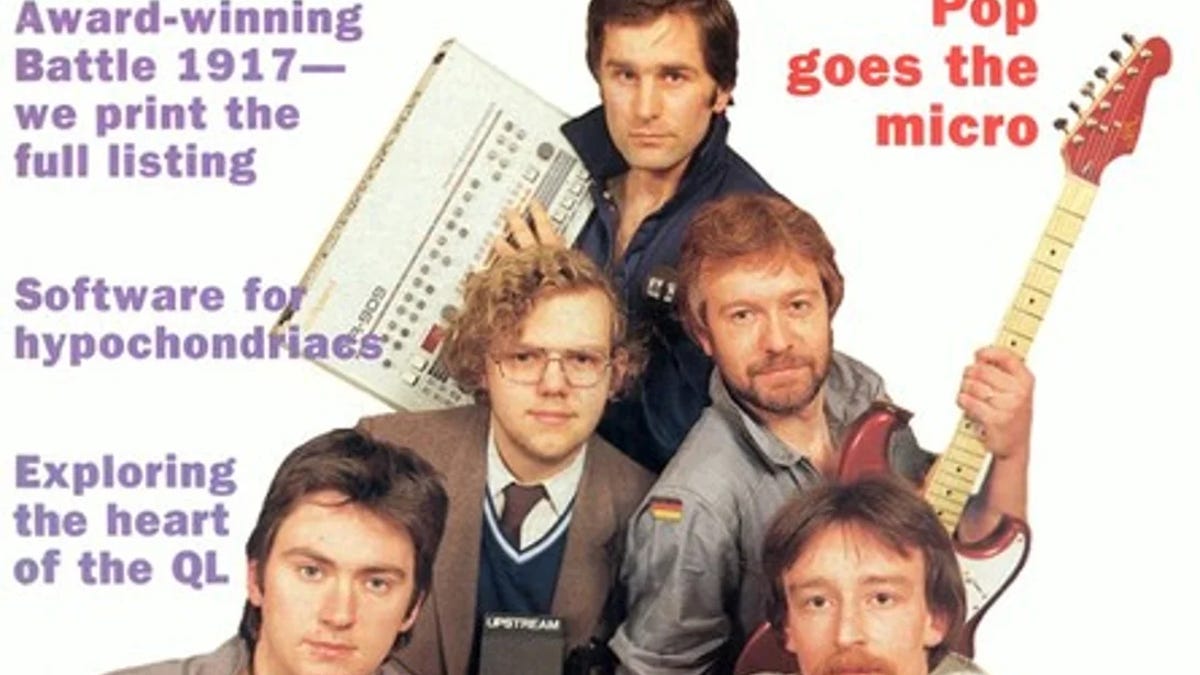Clive Sinclair's ZX Spectrum: 'This is where the UK games industry came from'
A former Sinclair employee explains why the company behind the iconic ZX Spectrum refused to understand its importance to a generation of gamers.

Sinclair User
The Sinclair ZX Spectrum was one of the most important early home computers, an affordable model that inspired a generation as it brought amateur programming and computer gaming to the masses. It was developed by colorful British technology pioneer and entrepreneur Clive Sinclair, who died Sept. 16, 2021.
In tribute to Sinclair's legacy, let's delve into the archives for a first-person look at the history of the hugely influential ZX Spectrum. In 2012, on the occasion of the ZX Spectrum's 30th anniversary, CNET'S Luke Westaway sat down with then ZDNet editor Rupert Goodwins, who was an employee at Sinclair. Goodwins was there during the 1980s wonder years of both the hit ZX Spectrum and the infamous Sinclair C5 electric trike. (That's Goodwins middle left in the tie, on the cover of Sinclair User magazine in 1984.)
This is that interview, first published April 23, 2012:
'It died halfway across the Hammersmith flyover'
I asked Goodwins which console he worked on, and was promptly reminded that "we didn't call them consoles back then!" My chastisement administered, he explained:
"I joined Sinclair after meeting Clive Sinclair at a dinner party, and he hired me on the spot. How cool is that? [Very cool.] I was actually there for the launch of the C5 -- I ended up driving a C5 on launch day from the center of town to Chiswick. It died halfway across the Hammersmith flyover. I wasn't impressed."
"I started off working on the Sinclair ZX Spectrum 128. My first job was to take the original Spectrum ROM -- the source code -- and make it work again, because it had stopped working. It was a stopgap product, as Sinclair was having trouble with money after the launch of the QL and the C5, lots of money had been spent on products that weren't making any money, so Sinclair was getting a bit nervous."
Later Goodwins worked on the 128's software, focusing on screen handling, and building the system's interface. He also did a ton of games testing, so got to play a whole lot of Daley Thompson's Supertest.
Goodwins told me the ZX Spectrum didn't actually make the company any money. Although it sold very well, word within the company was that 25% of devices were borked out of the box, with repairs and replacements proving costly for Sinclair.
'Games are for kids'
The Sinclair was incredibly popular, but what was the attitude inside Sinclair at the time? Did the company realize gaming's potential?
"This was a huge debate inside Sinclair. Because the Spectrum was a games machine, there's no point pretending it was anything else. We said, 'Why are we trying to make a business machine with a proper keyboard and stuff, instead of giving it a standard joystick port?'"
"Other people said, 'But we're Sinclair, we're far too good for games, games are for kids. We can't become a games computer company.'"
Clive Sinclair, founder and chairman of Sinclair Research, at the launch of the Sinclair 2-inch pocket television.
So did Sinclair realize that gaming was what people were using its products for? "Of course it did," said Goodwins. "But there was a steadfast refusal to accept that was a good way to go forwards."
"There was this thinking that if something wasn't a bit dull and good for you, it didn't deserve to have the Sinclair name on it," Goodwins told me. A lot of the company's direction was down to the boss, Clive Sinclair.
"He was developing all sorts of 'edge-of-technology' kind of stuff. That's where he wanted to be -- he wanted to be absolutely breakthrough, doing stuff that was so good it wiped out IBM. Making games machines did not fit into that plan."
'This is where the UK games industry came from'
The Spectrum's affordability meant kids everywhere used it to get their first programming kicks.
"You could buy a Spectrum at WH Smith's for £125, take it home -- it would take you two or three weeks to go through the programming manual, if you're that way inclined," Goodwins said.
"Then start digging into the machine. You could, within two or three months, be writing little games that were actually pretty good, and in six months you could have something that was as good as the rest of the market. By yourself. While going to school. Kaboom! This is where the UK game industry came from."
Kids today may not have access to the same tools for learning primitive coding. I asked Goodwins whether that was something missing from the tech experience today.
"It is -- I'm not sure whether it's as important as people say, something which pains me greatly, being a self-taught programmer who thinks programming is one of the most splendid things you can do with your life."
"I think there should be more emphasis on low-level programming," Goodwins said, telling me that the (then new) ultra-cheap Raspberry Pi is reason to be excited. "All the talk is that it's the next BBC Micro. I think it's closer to the Spectrum, because it's so cheap, and relatively limited.
"That would be good, if people picked up that and started to learn low-level programming."
Clive Sinclair reveals the battery-powered C5 to the press, Jan. 10, 1985.
'A bit more reality'
"Working at Sinclair... it was a wild place," Goodwins said. "So many brilliant people there, doing so many unbelievable things."
"If only it'd had a bit more reality."



